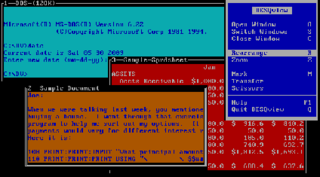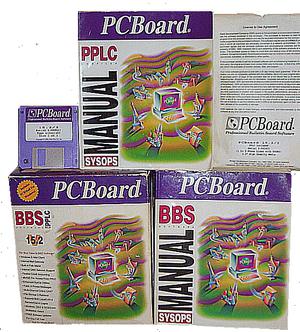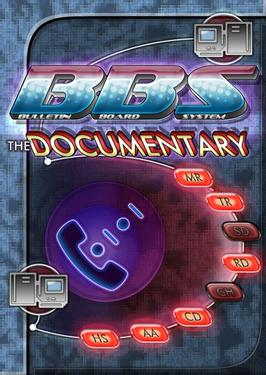
A bulletin board system (BBS), also called a computer bulletin board service (CBBS), is a computer server running software that allows users to connect to the system using a terminal program. Once logged in, the user can perform functions such as uploading and downloading software and data, reading news and bulletins, and exchanging messages with other users through public message boards and sometimes via direct chatting. In the early 1980s, message networks such as FidoNet were developed to provide services such as NetMail, which is similar to internet-based email.

Jerry Eugene Pournelle was an American scientist in the area of operations research and human factors research, a science fiction writer, essayist, journalist, and one of the first bloggers. In the 1960s and early 1970s, he worked in the aerospace industry, but eventually focused on his writing career. In an obituary in Gizmodo, he is described as "a tireless ambassador for the future."
Shareware is a type of proprietary software that is initially shared by the owner for trial use at little or no cost. Often the software has limited functionality or incomplete documentation until the user sends payment to the software developer. Shareware is often offered as a download from a website. Shareware differs from freeware, which is fully-featured software distributed at no cost to the user but without source code being made available; and free and open-source software, in which the source code is freely available for anyone to inspect and alter.
Uploading refers to transmitting data from one computer system to another through means of a network. Common methods of uploading include: uploading via web browsers, FTP clients], and terminals (SCP/SFTP). Uploading can be used in the context of clients that send files to a central server. While uploading can also be defined in the context of sending files between distributed clients, such as with a peer-to-peer (P2P) file-sharing protocol like BitTorrent, the term file sharing is more often used in this case. Moving files within a computer system, as opposed to over a network, is called file copying.

CBBS was a computer program created by Ward Christensen and Randy Suess to allow them and other computer hobbyists to exchange information between each other.

A bulletin board is a surface intended for the posting of public messages, for example, to advertise items wanted or for sale, announce events, or provide information. Bulletin boards are often made of a material such as cork to facilitate addition and removal of messages, as well as a writing surface such as blackboard or whiteboard. A bulletin board which combines a pinboard (corkboard) and writing surface is known as a combination bulletin board. Bulletin boards can also be entirely in the digital domain and placed on computer networks so people can leave and erase messages for other people to read and see, as in a bulletin board system.

DESQview (DV) is a text mode multitasking operating environment developed by Quarterdeck Office Systems which enjoyed modest popularity in the late 1980s and early 1990s. Running on top of DOS, it allows users to run multiple programs concurrently in multiple windows.

Thomas Daniel Jennings is a Los Angeles-based artist, known for his work that led to FidoNet, and for his work at Phoenix Software on MS-DOS integration and interoperability.
The Bread Board System (TBBS) is a multiline MS-DOS based commercial bulletin board system software package written in 1983 by Philip L. Becker. He originally created the software as the result of a poker game with friends that were praising the BBS software created by Ward Christensen. Becker said he could do better and founded eSoft, Inc. in 1984 based on the strength of TBBS sales.

PCBoard (PCB) was a bulletin board system (BBS) application first introduced for DOS in 1983 by Clark Development Company. Clark Development was founded by Fred Clark. PCBoard was one of the first commercial BBS packages for DOS systems, and was considered one of the "high end" packages during the rapid expansion of BBS systems in the early 1990s. Like many BBS companies, the rise of the Internet starting around 1994 led to serious downturns in fortunes, and Clark Development went bankrupt in 1997. Most PCB sales were of two-line licenses; additional line licenses were also available.

Charles Alton "Chuck" Forsberg developed two data transmission protocols popular in the 1990s, for uploading and downloading files from dial-up bulletin board systems. He received a Dvorak Award for Excellence in Telecommunications in 1992 for developing ZMODEM. He was also the project engineer on the Tektronix 4010-series graphics terminals.

BBS: The Documentary is a 3-disc, 8-episode documentary about the subculture born from the creation of the bulletin board system (BBS) filmed by computer historian Jason Scott of textfiles.com.
Electric Pencil, released in December 1976 by Michael Shrayer, was the first word processor for home computers.
Datastorm Technologies, Inc., was a computer software company that existed from 1986 until 1996. Bruce Barkelew and Thomas Smith founded the company to develop and publish ProComm, a general purpose communications program for personal computers. ProComm flourished in the pre-World Wide Web world, when personal computers used modems to connect over telephone lines with other individual computers, online services such as CompuServe, bulletin board systems (BBSs), Telnet and Gopher sites, and the like. Datastorm was the first company to grow from a shareware publisher into a large commercial software publisher. ProComm 2.4.3 for MS-DOS is still available as shareware.

The Toshiba T1000 is a discontinued laptop computer manufactured by the Toshiba Corporation in 1987. It has a similar specification to the IBM PC Convertible, with a 4.77 MHz 80C88 processor, 512 KB of RAM, and a monochrome CGA-compatible LCD. Unlike the Convertible, it includes a standard serial port and parallel port, connectors for an external monitor, and a real-time clock.
Qmodem was an MS-DOS shareware telecommunications program and terminal emulator. Qmodem was widely used to access bulletin boards in the 1980s and was well respected in the Bulletin Board System (BBS) community. Qmodem was also known as Qmodem SST and Qmodem Pro.

Integrated software is a software for personal computers that combines the most commonly used functions of many productivity software programs into one application.
The Z-100 computer is a personal computer made by Zenith Data Systems (ZDS). It was a competitor to the IBM PC.
Randy John Suess was the co-founder of the CBBS bulletin board, the first bulletin board system (BBS) ever brought online. Suess, along with partner Ward Christensen, whom he met when they were both members of the Chicago Area Computer Hobbyists’ Exchange, or CACHE, started development of CBBS during a blizzard in Chicago, Illinois, and officially established it four weeks later, on February 16, 1978.











